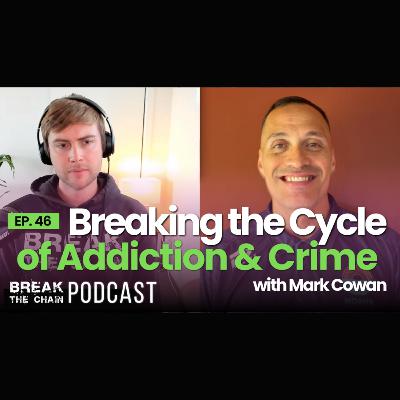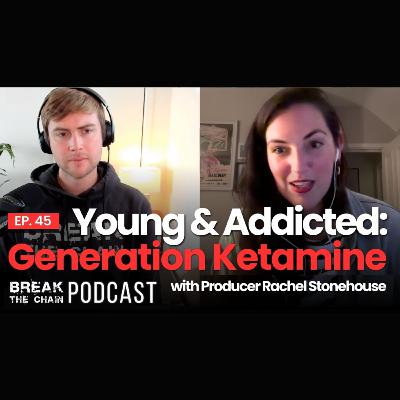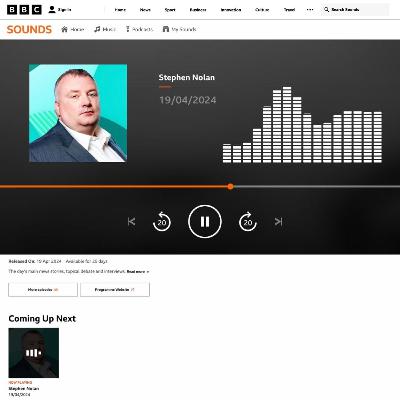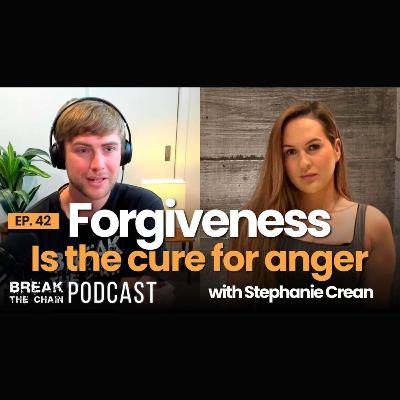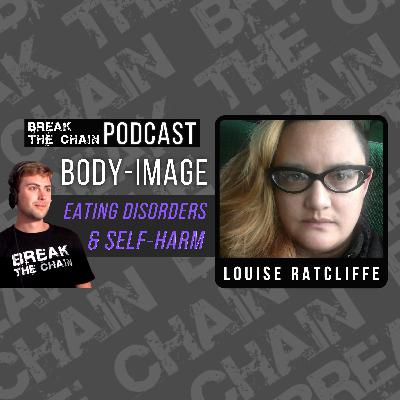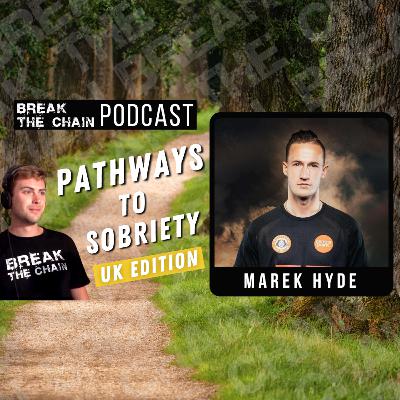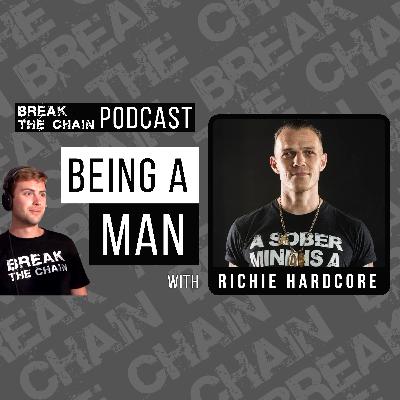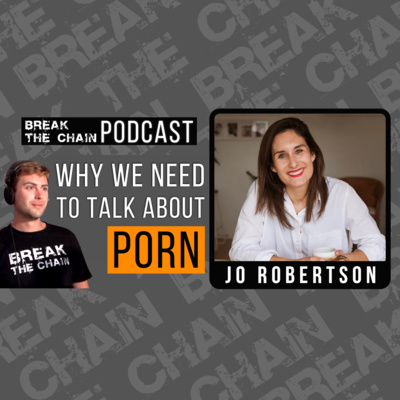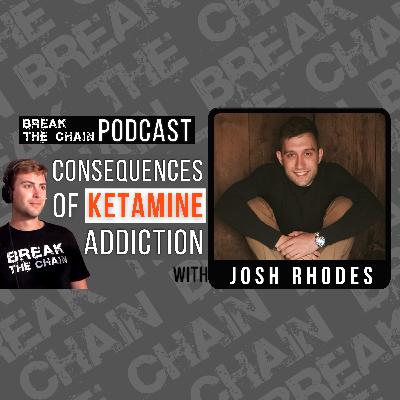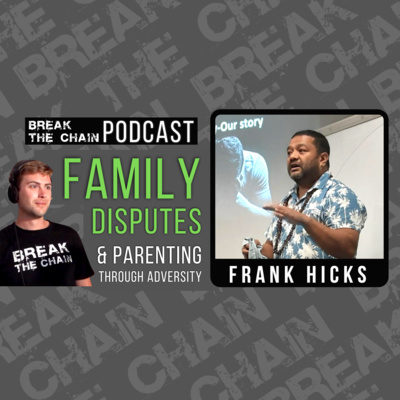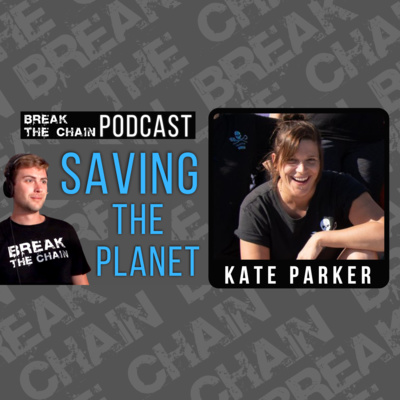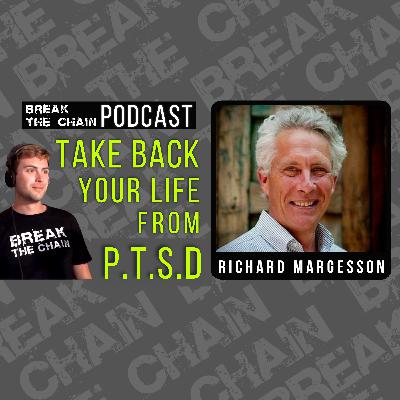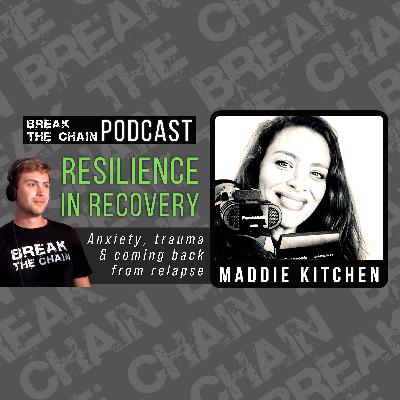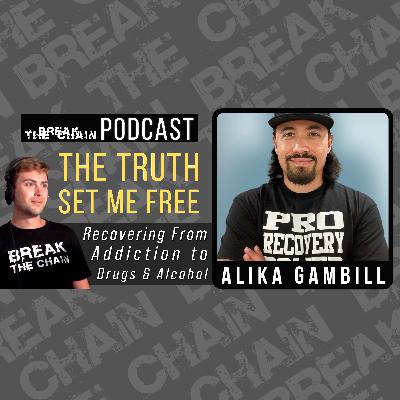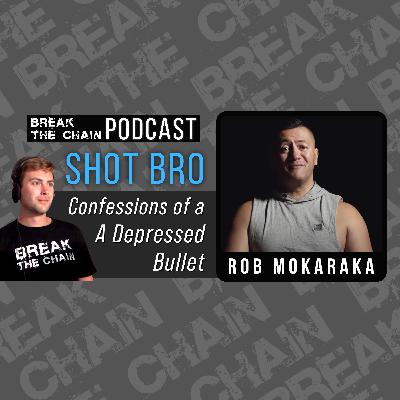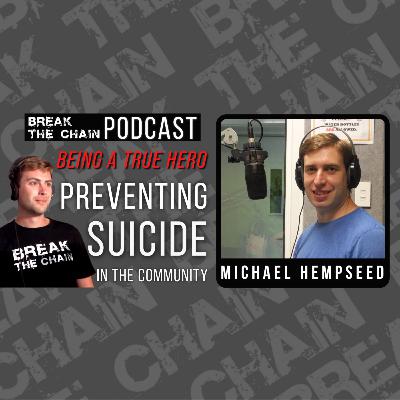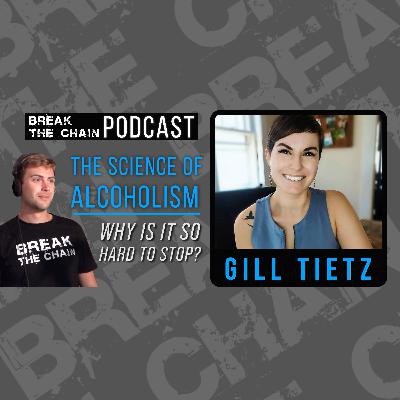Discover Break The Chain Podcast
Break The Chain Podcast

Break The Chain Podcast
Author: James Dear
Subscribed: 4Played: 39Subscribe
Share
© James Dear
Description
What would it feel like to be free?
Do you try to make changes in your life but constantly slip back into your old ways?
I know that I did and found myself constantly frustrated by my lack of willpower. What I never knew is that there was a reason why I could not control myself and that there are processes that you can follow to regain your freedom.
I interview some of the greatest, relatable, and compassionate minds; talking about breaking all varieties of bad habits and how to actually live a joyful and fulfilling life.
Listen now to free yourself from the shackles of the mind.
Do you try to make changes in your life but constantly slip back into your old ways?
I know that I did and found myself constantly frustrated by my lack of willpower. What I never knew is that there was a reason why I could not control myself and that there are processes that you can follow to regain your freedom.
I interview some of the greatest, relatable, and compassionate minds; talking about breaking all varieties of bad habits and how to actually live a joyful and fulfilling life.
Listen now to free yourself from the shackles of the mind.
46 Episodes
Reverse
Episode Summary: In this powerful episode, we sit down with Mark Cowan, a former inmate who spent 20 years in and out of prison due to his struggles with addiction. Today, Mark is on the other side of the prison walls as an addictions counsellor, using his personal experiences to help incarcerated individuals break the cycle of addiction and crime. Mark shares his journey from a life of crime to becoming a present father, a role model, and a community asset. He opens up about the turning points in his life, the impact of drug court, and his mission to give hope to those who feel trapped in the same cycle he once knew all too well.
Key Topics Covered:
Mark’s Journey: Mark talks about his life from ages 17 to 37, when prison was a second home due to his addiction to various substances and a lifestyle of crime, primarily burglary.
Life Behind Bars: Mark describes how he navigated prison life, finding some comfort in a familiar environment, but also the monotony and the endless cycle of getting locked up, released, and re-offending.
Breaking the Cycle: Mark shares the moment that changed everything—his introduction to drug court, which focuses on treatment for offenders. He discusses how getting clean ended his need to steal and allowed him to rebuild his life, becoming a father and a role model.
Transition to Counselling: Mark discusses his journey from inmate to counsellor, his motivation to help others, and how his personal story shapes his work with incarcerated addicts today.
Giving Hope: Mark explains his approach to counselling, which centres on giving hope to those who are still struggling. He shares some of the techniques and strategies he uses to connect with clients and inspire them to change.
Challenges and Reflections: Mark reflects on the challenges he faces as a counsellor, the misconceptions about addiction and crime, and how he deals with setbacks both personally and professionally.
Community and Cultural Influence: Mark speaks about the importance of being a role model in his community and how his Samoan/Cook Island heritage informs his work and helps him connect with clients on a deeper level.
Future Hopes: Mark talks about his hopes for the future, both for himself and the people he works with, and shares advice for those currently in the position he once was or those considering a career in addictions counselling.
Connect with Us:
Follow us on social media for updates and more inspiring stories.
Subscribe to the podcast to never miss an episode!
Check out our website to find out more about Break the Chain and to check out all of our content
Breakthecain.net
Call to Action: If Mark’s story resonated with you, please share this episode with someone who might need to hear it. Don’t forget to rate, review, and subscribe to the podcast. Your feedback helps us bring you more stories that matter.
In this episode, I speak with Rachel Stonehouse, an Investigative Reporter and documentary producer for BBC News and formerly for BBC NewsBeat. She recently produced and presented the documentary ‘Young and Addicted: Generation Ketamine” which took a graphic look at the impacts of recreational ketamine use.
For anyone who doesn’t know,
Ketamine is a medical drug that has been used since the 70’s. It is safe in small doses and is effective in assisting the treatment of some mental health conditions. Ketamine is also popular as an illicit drug in the UK, Europe, North America, and many countries in Asia and is growing in popularity in Australia and New Zealand.
As stated in the documentary, Government figures have shown that Ketamine addiction has more than quadrupled since 2016 in England and Wales. What may not yet be common knowledge is that the drug has serious health consequences.
Rachel gives of background about herself and how she ended up involved in the documentary. She tells us what inspired her to specifically make a documentary about ketamine addiction. She shares insights from her experience and how this has changed her views of the drug.
She discusses insights from people she spoke to with lived experience as well as experts. She tells us the ways that she hopes the documentary will contribute to public understanding and awareness. Including specific policy or societal changes, she hopes the documentary will inspire regarding drug education, treatment accessibility, or harm reduction efforts.
The links that we mentioned in this episode were:
https://www.bbc.co.uk/actionline/
https://www.reddit.com/r/Ketamineaddiction/
Learn more about us at breakthechain.net
In this interview, Rachel Stonehouse & James Dear were featured on BBC 5 Live with Stephen Nolan, following the release of the documentary 'Young & Addicted: Generation Ketamine. James was asked to share his experience as a ketamine addict as well as give some brief advice for anyone who may be addicted or considering using the drug for the first time.
The full documentary can be watched in the UK via the link below. A shorter version is due to be released to YouTube.
https://www.bbc.co.uk/programmes/m001yp76
In this episode, I speak with Joe Ramsden,
Two years ago, on the very day of this year's London Marathon, Joe found himself hospitalized for the first time amidst a series of visits, gripped by the debilitating symptoms of MS. Struggling to walk or see, and plagued by relentless bouts of vomiting upon attempting to open his eyes, Joe's condition left medical professionals perplexed.
After a harrowing ordeal, he was finally diagnosed with a severe form of Multiple Sclerosis (MS). Joe suffered two relapses but Joe made his wellbeing and lifestyle balance a priority. He made a recovery and decided to run the London Marathon with a 360-degree camera strapped to him to raise money for two fantastic charities, The MS Society and Mind.
All links to follow Joe, donate, and show him your support on social media can be found via the link below.
linktr.ee/readysteady_joe
In this episode, I speak to a truly inspiring woman, Stephanie Crean.
We do not speak much about the devastating events that shaped her life due to their heinous nature and the effects that they have left on her family and community. When Stephanie was just 2 years old, 4 men were ordered to murder her father. The first time they arrived at their house her was holding Stephanie in his arms, she was just 2 years old at the time. They were ordered to return and kill her even if he was holding his 2-year-old daughter. When he returned to the door he was not holding Stephanie and was tragically murdered.
By the estimations of many these acts were unforgivable, however, after seeing the suffering that the events of the past were bringing to family and community she realised, on a deep level, that she had to make a change. In the morning, in the early hours, she wrote a letter addressed to the 4 men who had killed her father (Chris Crean). In that letter, Stephanie expresses complete and compassionate forgiveness for these men – “so that you may have peace and I too. So that our families may have peace, and so that the community may have peace also. So that the nation may have peace, because that is what is right.”
There was a recent movie made about the killing of her father titled “Resolve”.
Her letter is deeply moving and has affected the lives of many people. I highly recommend reading it. You can read the letter on her blog, My Life's Journey, by clicking the link below:
https://www.facebook.com/mylifejourneyblog/posts/1967749856837704
You can watch the full movie about her father's story on YouTube by clicking the link below:
https://www.youtube.com/watch?v=PSnU43PYYjE&t=1349s
This is a valuable episode for anyone struggling to find self-worth.
Louise Ratcliffe is a friend and fellow classmate who is training to be a counselor. She has come on the show today to talk about eating disorders, body image, and self-harm. She herself has suffered from these issues as I'm sure the majority of us have to some degree.
We discuss a whole myriad of topics during this podcast but they mostly hinge around self-worth specifically relating to the body and the way we see ourselves.
Some of the other topics that we discussed are:
Bulimia
Diet culture
Body diversity
Body Neutrality
Obsession
Addiction
Self-love/self-hate
Self-care
The impact that external influences have on us
And the myths about freedom
During this podcast, she recommends watching the embrace movie:
https://www.youtube.com/watch?v=nwpb_zOZFkk
This book:
https://thefuckitdiet.com/
And here are some more resources that she shared with me:
https://haescommunity.com/
https://www.healthline.com/health/body-neutrality#psychology
We hope that you enjoy this episode and it helps to free you from the shackles of the mind x
To learn more about Break The Chain
https://linktr.ee/breakthechain
Are you addicted to alcohol or substances and finally ready to do something about it but don't know where to start?
Then this episode is for you. I talk to Marek Hyde a recovering addict who has worked in the addiction field for 6 years. We are aware that the path to sobriety can be an overwhelming one. This is why we wanted to share with you some of the different options that you have in the United Kingdom whether you have access to money and other resources or not.
Some of the different options that we discuss are,
-The NHS route
-Checking in with a GP
-Local addiction services
-The importance of finding an advocate
-Alcoholic Anonymous/Narcotics Anonymous
-Seeing a counsellor
Some of the services mentioned were,
-Carpenters Arms
-Loughborough https://www.carpenters-arms.org/
-Betels https://www.betel.uk/
-Jericho house https://www.jerichosociety.org.uk/location/derby/
-Guide to free addiction helplines https://www.lifeworkscommunity.com/addiction-treatment/guide-to-uk-free-addiction-helplines
Useful contacts
https://www.mind.org.uk/information-support/types-of-mental-health-problems/recreational-drugs-alcohol-and-addiction/drug-and-alcohol-addiction-useful-contacts/
What does it mean to be a man? Where do we get ideas about what that means?
In this episode, I was joined by retired muay Thai champion and mental health advocate Richie hardcore to explore this idea amongst some other topics such as mental health and addiction. Richie is also an educator and public speaker who works in family and sexual violence prevention, and fitness. He also spent 6 years working in drug harm prevention.
Richie stated that he was a sensitive kid that liked reading books but fighting at school made him cool. Being masculine also made him feel strong and cool but he said that he was fortunate enough to be steered away from that path and didn't turn to gangs and violence like his friends. He credited a lot of this to his passion for martial arts and the sober culture of the straight-edge hardcore scene.
Richie shares his life story then we dive deep into ideas surrounding masculinity from both a sociological and spiritual perspective. Finally, Richie tells us about his battle with depression and suicidal ideation and how he pulled himself out of that dark place.
I really enjoyed this conversation. Richie does some fantastic work, please check him out.
https://www.richiehardcore.com/podcast https://www.facebook.com/richie.hardcore
https://www.instagram.com/richiehardcore/?fbclid=IwAR2RQyyoQsg7S96MDvqhmBmE0aDmgQzgOMctup7CY7xhK5t788RXyOMyZFc
In this episode, I talk to ex US marine and MMA fighter Tim Lodgen about his 27 year battle with alcoholism and other substances. Tim tells us that he doesn't remember his 20s and his drinking got really bad whilst during the Marine core. He suspects that it got worse due to trauma from the marines as well as his father leaving when he was 7. Tim tells us that he was drinking shots before work, being verbally abusive to his family, crashed a car and didn't remember, and was facing jail time due to his anger. Tim hit rock bottom when his wife told him that he couldn't be there anymore and shortly after his wife found him in the process of taking his own life.
Tim got sober when his good friend and Jackass star Brandon Novak called him when he was at his lowest point offering him the opportunity of a lifetime. Brandon got him a plane ticket and booked him into rehab. After going through the 12 step rehabilitation process Tim has now been sober for 10 months and radiates nothing but gratitude. He is on a mission to change the world for the better.
Tim said “Giving up is not an option, getting up is the only option”, “I didn’t realize I was in a cage and the one holding the key” This is an inspiring story of hope that proves that it is possible to get sober even after 27 years.
Please follow Tim's journey
@Lodgen_tim on Instagram or Tim Lodgen on Facebook
You can support the podcast and help us by making a donation to our Patreon. Break The Chain is not for profit and relies on your kindness and support to keep the show on the road.
https://www.patreon.com/breakthechain
:)
In this episode, we talk to sex therapist and porn researcher Jo Robertson.
We talk about navigating the new porn landscape and the effects that it is having on children, teenagers, and adults. We also talk about the dynamics between sex life and living a happy and fulfilling life.
Some of the topics that we cover are
-How the porn landscape has changed over the years
-Should sex be positioned as the goal of life?
-The effects of using porn
-The age of children/teenagers when they first come into contact with porn and what parents should do about it
-The subliminal messages that are found in porn
-Healthy ways of learning about sex
-Consent and sexual violence
-Porn in relation to mental health and addiction
-What age should we talk to children about porn
Jo is a sex therapist and betrayal trauma specialist. She has a post-graduate diploma in counselling and a masters of science in medicine specialising in sexual health and psychosexual therapy. She also works as the Research and Training Lead for The Light Project, which is a charity equipping youth, their families, and professionals to navigate the new porn landscape.
To find out more about the amazing work that Jo does please take a look at her website and the other work she is involved with.
https://www.jorobertson.org/
https://thelightproject.co.nz/
Instagram @sextherapistjo
www.clue.com
In this episode, I talk to my friend Josh Rhodes about ketamine addiction, its consequences, harm reduction, and the journey to sobriety.
As many people will know ketamine has some heavy consequences when paired up with addiction and excessive usage. If you are interested in this then skip to the end where we also talk about harm reduction. We decided to wait until the end because they can be difficult to talk about.
Josh suffered from "K bladder" (bladder cystitis). The symptoms were severe and would cause him to pass urine and jelly-like substances in his urine. He had multiple operations to address this problem including a cancer scare. He has now managed to start a new life where he only occasionally uses when he goes home to where he suffered the worst with his addiction (around 3 times a year) and his bladder situation has improved considerably.
We also discuss other effects such as K-cramps, the nature of addiction, social, financial, family problems.
Ketamine’s effects when abused. (This is an absolute guess but based on what I have observed. 2+ grams per day consistently can cause these problems. Everyone is different and some manifest symptoms way sooner. Not likely to happen from mild usage and has been proven safe to use in medical and clinical circumstances.)
-bladder walls become thickened and lose elasticity. Potential cystitis, and ulceration.
-urinary tract (urine in the blood)
-extremely painful to pass urine
-back pain -blocked kidneys
-kidneys can become damaged due to increased pressure caused by shrunken bladder
-potential kidney failure -incontinence -bladder cystitis
-shrunken bladder (50ml)
-thickened bladder walls
-scarred bladder
If you stop using most cases show a dramatic improvement within 3 months.
Some of our harm reduction tips are:
-Cook the ket into powder and avoid using it in crystal form.
-Drink plenty of water even before bed. It may seem counterintuitive but it will help your bladder to be less irritated.
-Before bed or even during the day, sniff water before bed to clear out nostrils to prevent damage to your nose.
-Don’t swallow the chemical into the stomach.
-Eat well and try to take care of yourself the best you can.
Most of all make a proactive move towards getting into recovery - don’t stay in the dark.
In this episode, Frank Hicks joins us to talk about handling family disputes after spending years in the courts over the custody of his children. He is the founder of Guardians of Our Children (GOOC) which is a charitable trust who works to protect children by helping their parents through the disputes process to reach a peaceful resolution.
Frank advises us on how to navigate our way through these incredibly difficult situations as well as giving us the best advice that we can take on board to regain custody of our children and do what is in the best interest of the children's future. He discusses the dangers of emotions over logic and shares his personal struggles in this area. One of the main areas he elaborates on is co-parenting, what it means and why it is in the best interest of the entire family if it is possible.
Frank hopes that the information he shares can save families an infinite amount of stress, time, and money.
To find out more about Guardians of our children visit: https://www.gooc.org.nz/
Facebook: https://www.facebook.com/GOOCNZ/
Kate Parker is well known for her ocean activism with Sea Shepherd and other organisations.
In this episode, we talk about the real problems that the planet is facing and it is not what you would expect. Kate took to a life of activism after watching the Cowspiracy documentary which highlighted the devastating effects that agriculture and commercial fishing have on the environment. She decided to protect the oceans because various processes that take place are responsible for the majority of the oxygen we breathe: meaning no fish = no humans.
We delve deep into the psychology that leads to the destruction of a planet based upon the famous quote by Gus Speth, who is an American environmental lawyer, and advocate, he’s the former dean of the Yale School of Forestry and Environmental Studies, and the former Administrator of the United Nations Development Programme, he stated: “I used to think that top environmental problems were biodiversity loss, ecosystem collapse, and climate change. I thought that thirty years of good science could address these problems. I was wrong. The top environmental problems are selfishness, greed, and apathy, and to deal with these we need a cultural and spiritual transformation. And we scientists don’t know how to do that.”
We discuss some of the mind-blowing statistics from a variety of documentaries including Cowspiracy, Seaspiracy, and Sea of Shadows.
Here are some of the statistics:
-Whales fertilize plankton which is responsible for 85% of the world's oxygen.
-Sharks kill 12 people a year/humans kill 11K sharks per hour.
-Livestock and their byproducts contribute to 51% of greenhouse gases.
-All transportation exhaust emissions are only 13% of greenhouse house gases.
-Producing one hamburger uses the same amount of water as 2 months of showers.
-There isn’t enough land on the planet for people to eat meat in the same way that countries such as the UK and the USA do.
-Animal agriculture is the leading cause of species extinction, ocean dead zones, water pollution, and habitat destruction.
-At the current trajectory it is estimated that there will be no fish in the oceans by 2048.
-A person who follows a vegan diet produces the equivalent of 50% less carbon dioxide, uses 1/11th oil, 1/13th water, and 1/18th land compared to a meat-lover for their food.
-Each day, a person who eats a vegan diet saves 5000 litres of water, 20 kilos of grain, 9 metres of forested land, 20 lbs CO2 equivalent, and one animal’s life.
Check out what Kate does by visiting Daughters of the Deep https://linktr.ee/daughtersofthedeep
Sea Shepherd https://seashepherd.org/
Richard shares his journey of healing from P.T.S.D. from the perspectives of an ex-psychologist, hypnotherapist, and war veteran.
We take a comprehensive look at post-traumatic stress disorder starting with: what it is, its symptoms, and the functions that it plays. We talk about getting triggered and what you yourself and others can do to help when it happens. We finally discuss some of the treatment options that are available as well as Richard's personal healing journey.
Richard served as an officer in the British Army for 20 years, in a number of war zones, and as the queen's guard at Buckingham Palace. He suffered from post-traumatic stress disorder from his army career and decided to work in psychotherapy and hypnotherapy for many years. He is also the founder of the Walk of War charitable project that raises awareness for post-traumatic stress injury amongst front-line public servants.
You can find Richard on his website: https://freethetree.co.nz/about/
He also has a series of free audio products for deep relaxation, stress management, and wellness on bandcamp: https://richardmargesson.bandcamp.com/album/step-inside-natures-therapy-room
We were very fortunate to have Acharya Das on the podcast again.
We talk about some of the fundamental problems that society is facing such as addiction, anxiety, depression, dissatisfaction, suicide, and mental illness as well as the underlying factors that are causing them.
Acharya Das is a teacher of the Vedic and Yoga philosophy, meditation, and Kirtan. He has been teaching meditation all over the world for over 45 years including in prison systems.
Some of the topics that we touch on are:
-The impacts of purposelessness, nihilism, arrogance, and self-centeredness
-The effects of the philosophy of individualism
-The effects of John Keynes, Edward Bernays, and the impact of consumer economics
-The importance of duty -The impact of social media
-Factors contributing towards ill mental health
-Addiction
-Anxiety
-Depression
-Suicide
-And the equation for happiness
Maddie Kitchen has been in recovery from alcohol addiction for 15 years. She joins us to discuss a wide range of topics including adverse childhood experiences and trauma, depression, anxiety, and agoraphobia; how she got sober and recovered from two relapses, and about her film-making company.
She is the founder of Sobriety Films CIC which is a not-for-profit organisation that makes documentaries, films and does workshops to raise awareness for recovery from addictions and mental ill-health. She has now been in recovery from addiction for an impressive 15 years so I am really looking forward to hearing a bit more about your journey.
Be sure to follow Maddie's incredible work:
https://sobrietyfilms.com/
https://www.facebook.com/sobriety.films.uk/
https://www.instagram.com/sobriety_films/
Find out more about Break The Chain:
https://linktr.ee/breakthechain
In this episode, Alika from Pro Recover Power tells us how he managed to get free from a 20-year addiction to alcohol, drugs, and lying.
He told us at one point he was going to church because he knew it would be good for him but he was still doing lines in church and he couldn't stop telling lies. He discovered that telling the truth gave him the same relief that alcohol did and was the foundation of his recovery.
Listen to Alika's incredible story to find out how he managed to reclaim his freedom.
Alika is a recovering addict who is now a substance abuse counsellor and the founder of Pro Recovery Power and intends to make a huge impact on the world and save as many people as possible from this affliction.
Find out more about what Alika does at PRP:
https://prorecoverypower.com/
https://www.instagram.com/pro_recovery_power/
Rob kindly joins James to discuss his gripping near-death experience and recovery from depression and trauma.
In 2009 Rob had a mental and spiritual breakdown in Auckland and provoked the police to shoot him dead. He was shot at close range in the chest by a Glock 9mm bullet. After multiple surgeries and court cases, Rob started therapy and went on to create Shot Bro - Confessions of a Depressed Bullet, a story of his life that is; Funny, Dark, Real, and Educational.
Rob is now invited to communities and organisations, including NZ Military bases, Prisons, and Probation Centres around the country to share his story. A show that is both humorous and hard-hitting, Shot Bro exists to start conversations, so people know that they are not alone and that they are allowed help to heal. His story is funny but very real. Each show is followed by a wananga/forum, with kai and cups of tea to whakanoa/ground the community afterwards.
Rob says that he isn’t an expert, but his real-life journey makes people feel safe, knowing that he understands. “Crying is better than dying and we can’t change the past, but we can change the present. #OutOfTheDarkWithAroha”
We highly recommend checking out the incredible Shot Bro show:
https://www.facebook.com/SHOTBRONZ
Watch Rob's inspiring documentary here:
https://www.youtube.com/watch?v=_3G6b0YCxXg&t=265s
This is hands down one of the most important episodes to date! Michael is the author of the book "Being a True Hero: Understanding & Preventing Suicide in Your Community". The website for the book is www.beingatruehero.com. The book is being used by the New Zealand Police, Fire and Emergency New Zealand, GPs, Counsellors as well as many parents and teachers.
Michael speaks to thousands of people every year. On average he delivers two to three seminars per week. On really busy weeks he can deliver up to nine seminars. He has spoken at TedX Darwin.
In this episode, we discuss how we can learn to recognise the early signs that someone might be feeling suicidal and what we as individuals and a community can do to support them. Some of the topics that we discuss are mental health conditions underlying suicidal tendencies, anger, forgiveness, dealing with failure, and much more.
I highly recommend reading Michaels's book: it is presented in a simple and easy-to-read way and is full of vital and valuable information!
Paperback book available here. https://www.amazon.com/dp/0473471906
Kindle edition available here. https://www.amazon.com/dp/B07P4539ZM
"Michael holds a wealth of knowledge in the space of mental health, suicide, and young people. He delivers that information in a way that leaves the receiver feeling empowered to use that information within both their work and personal lives. Michael's sensitivity to difficult topics such as suicide is apparent and perfectly presented." - Amy Walters, Manawatu District Council Youth Focus Group
Find out more about Break The Chain below
linktr.ee/breakthechain
Gill Tietz is the host and creator of the fabulous Sober Powered Podcast.
She is a recovering alcoholic and has a BS in chemistry and an MS in biology which gives an incredible platform for the foundation of this conversation. She got sober in 2019 because alcohol caused the complete destruction of her mental health. Now, she teaches what she has learned about why it’s so hard to stop drinking, why alcohol makes us so miserable, and how to embrace sobriety.
She spent 5 years dedicated to learning how to moderate her drinking. She researched moderation tirelessly and tried every strategy she could think of. No matter how bad things got for her, she always believed she could learn to moderate if she just had enough practice. Things continued to escalate until her drinking scared me enough to stop due to suicidal thoughts.
She wants to help you accept sobriety sooner than she did so you don’t have to spend any more time being stuck in the drink, hate yourself, drink cycle.
Check out Sober Powered below :)
Website: https://www.soberpowered.com/
Facebook: https://www.facebook.com/sober.powered
Facebook group: https://www.facebook.com/groups/779948102522537
Instagram: https://www.instagram.com/sober.powered/
@sober.powered_
Find out more about Break The Chain Below
linktr.ee/breakthechain


